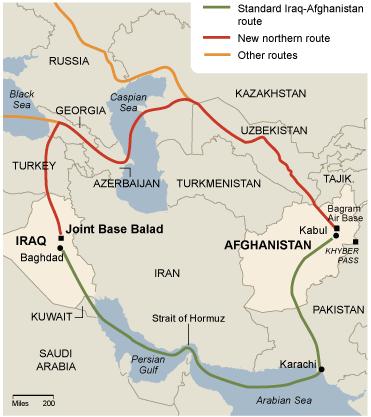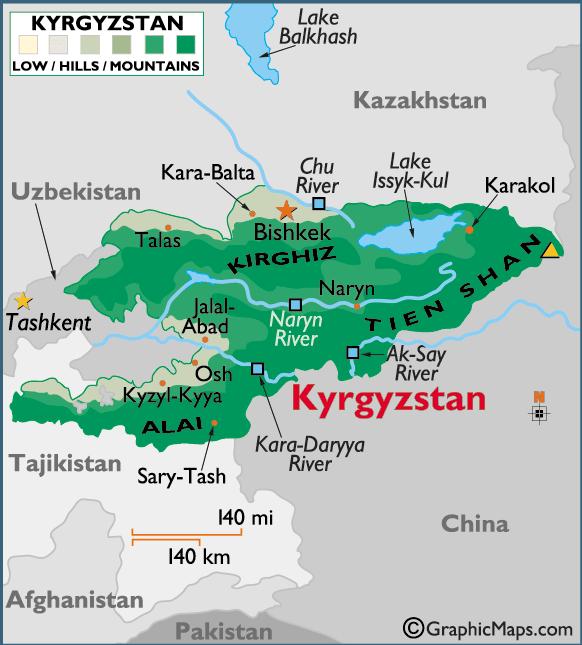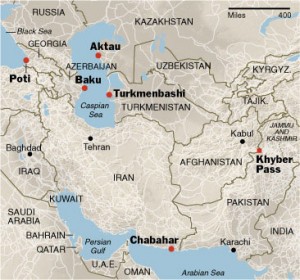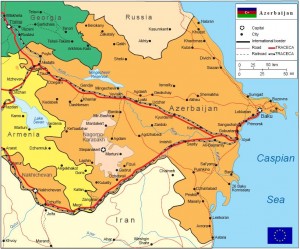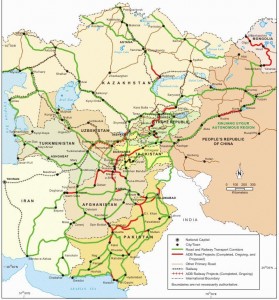It’s Time To Engage the Caucasus Part III
BY Herschel SmithFrom The Times of India:
The US is now less dependent on Pakistan for supply of cargo for its troops fighting al-Qaida and Taliban militants in Afghanistan, a Congressional report said today, amid a standoff between Washington and Islamabad over supplies through the country.
The Senate committee report said that only 29% of the total Afghan cargo supply now goes through Pakistan; which about an year ago was nearly 50%.
Islamabad has closed the crucial Nato supply route from Pakistan after the November 26th airstrikes that killed 24 of its soldiers.
“An estimated 40% of all cargo transits the NDN (Northern Distribution Network), 31% is shipped by air, and the remaining 29% goes through Pakistan. An estimated 70% of cargo transiting the NDN enters Afghanistan via Uzbekistan’s Hairaton Gate,” the Senate Foreign Relations Committee said.
Since 2009, the US has steadily increased traffic on the Northern Distribution Network (NDN), a major logistical accomplishment.
According to US Transportation Command, close to 75 per cent of ground sustainment cargo is now shipped via the NDN, it said.
As a result of increasing dependence on NDN for supply of logistics and cargo to its troops in Afghanistan, Senator John Kerry, chairman of the Senate Foreign Relations Committee emphasized that there was a need to build relationship with the Central Asia countries.
“Central Asia matters. Its countries are critical to the outcome in Afghanistan and play a vital role in regional stability. As we reassure our partners that our relationships and engagement in Afghanistan will continue after the military transition in 2014, we should underscore that we have long-term strategic interests in the broader region,” Kerry said.
And of course, you heard about the need for this transition here before you heard about it anywhere else. But there is a catch. Kerry is right – Central Asia matters, but our lines of logistics now rely exclusively on routes through Central Asia and Russia (whereas I had recommended a logistics line from the Mediterranean Sea through the Bosporus Strait in Turkey, and from there into the Black Sea. From the Black Sea the supplies would go through Georgia to neighboring Azerbaijan. From here the supplies would transit across the Caspian Sea to Turkmenistan, and from there South to Afghanistan). The added benefit of such a logistics line would be increased spending, influence and authority in the region, a region heavy in oil and natural gas.
The Caucasus region matters too. From The Jamestown Foundation:
The “disbalance of interests” (see EDM, December 15), favoring Russia over the United States in the South Caucasus, used to be offset by superior US resources, attractiveness and credibility. But that offset has diminished as US policy turned toward de-prioritizing this region (compared with the earlier level of Washington’s engagement). Lacking a strategy for the South Caucasus, the US has taken a back seat to Russia at least since 2008 in the negotiations on the Armenia-Azerbaijan conflict.
Washington had reduced its profile and role on this issue (and on South Caucasus regional security writ large) already during the second term of the Bush administration. It folded the Karabakh conflict portfolio into other portfolios within the State Department; it handled this issue through medium-level diplomats versus Russia’s top leaders; and it separated this issue from US regional strategy, which was itself fading out. Under the Obama administration, the policy drift grew more pronounced, with domestic politics distorting US diplomacy on the Armenia-Azerbaijan conflict.
Takeaway point: “Lacking a Strategy.” Read the whole report. What other administration could pull off such a feat? We have transitioned our logistics lines to the North (as I recommended almost three years ago), all the while alienating the Caucasus region in favor of Russian routes. Meanwhile, while every other nation is preparing to cut and run from Afghanistan, including the U.K., Georgia is literally doubling down on its troop levels in Afghanistan.
What a strange world in which we live. Georgia is begging to be our ally, assisting us in Afghanistan at their own peril, and we have the chance to increase U.S. authority and presence in the Caucasus, and choose instead to empower Russia. Again, what other administration could pull off something like this?
